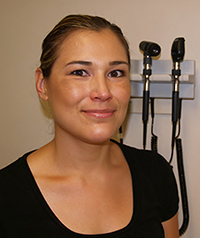 Why did you choose your specific health professional career?
Why did you choose your specific health professional career?
Medicine took me a little more time to define because it wasn’t something I dreamed of doing from early on. As an undergraduate, I initially started out as an engineering major but quickly lost interest in that. With the help of my advisors and talking to other students who were interested in the health professions, I decided to take more biology and science classes. My interests sort of grew from there and also when I started working for the Minority Biomedical Research Support Program at Montana State University which really peaked my interest in medicine.
What experiences did you have to make sure this profession was right for you?
During the summer of 1994, I did the Minority Medical Education Program (MMEP) in Tucson, AZ. MMEP gave me a brief glimpse of what clinical medicine was like and it also helped me prepare for the MCAT and made medical school a little more attainable to me. I think MMEP was a good place to start.
Describe any obstacles or barriers to success that you encountered along your health professional career path. How did you overcome them?
I can’t say I’ve had tremendous obstacles, but I know that some of the distractions that I had, especially as an undergraduate, could have easily derailed my focus from school. I managed to stay on task although I think it’s very easy for college students to fall off track. When I started as an undergraduate at Montana State University, there were probably about ten Native American students in my little social circle who started the freshmen year with me. Only one or two of us came back the following year. So that alone really narrowed down the number of Native American college students pretty quickly.
What do you do in your current job?
Right now, I work in the primary care clinic at the Phoenix Indian Medical Center (PIMC). I primarily see patients in the outpatient clinic and on occasion I do some inpatient work. I also work in the labor and delivery deck and some outpatient pediatric clinic work as well.
What advice do you have for American Indian/Alaska Native students who are interested in health careers?
Don’t let other people or other things distract you. School is a full time commitment and to pursue a career in medicine is a very full time commitment. If you allow things to distract you, especially as an undergraduate student, your school will suffer for it.
What would you like to see for your tribe’s future?
I think I would like to see a continued commitment to increasing education and resources for the Navajo Nation, particularly the scholarship program. I think that has been a wonderful resource for Navajo students, which dates back to the 1970s when the Navajo Nation President, Peter McDonald, set up the Navajo Nation Scholarship program. They were forward looking people who realized that our people are our greatest resource.
Do you practice traditional medicine? If you do, then how does traditional medicine interact with conventional medicine?
I don’t practice traditional medicine. My training is in allopathic medicine. I think there is a role for traditional medicine but I do not have that training.

